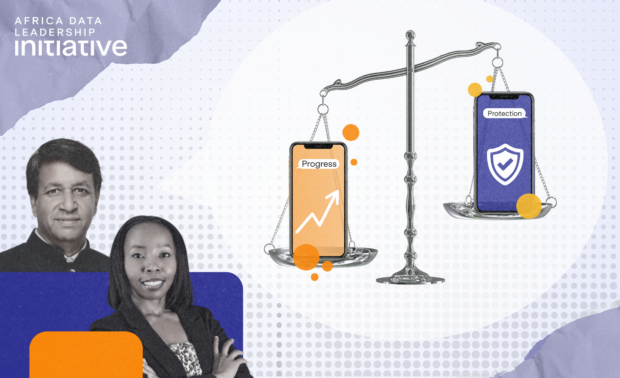Personal data can be both sensitive – and consequential. When assets like civil registry data, or health, education, and financial records are harnessed responsibly, they can provide extraordinary benefits. In a safe data ecosystem, the infrastructure, policies, institutions, and markets work together to support the collection, sharing, and utilization of data to create value for people.
Our latest Africa Data Leadership Initiative peer-learning session explored the components of such a data ecosystem, focusing on how different African countries leverage data for economic and governance benefits. Participants discussed innovative approaches and strategies for creating value from data, explored real-world examples, and discussed opportunities in their respective countries.
To guide the discussion, we invited guest speakers:
- Karen Bett, Senior Policy Manager – Data Equity and Inclusion, Global Partnership for Sustainable Development Data
- Morine Amutorine, Africa Sandboxes Forum Lead, Datasphere Initiative
This week’s session also featured a showcase from an ADLI cohort member:
- Comfort Mare, Senior Program Manager, GanzAfrica: Land Market Data Analytics
Better data systems lead to better decisions, which lead to better outcomes.
Robust data ecosystems can enable informed decision-making, optimize resource allocation, and enhance coordination and accountability across sectors. Therefore, Karen emphasized, investments in strong data systems and strategies are worthwhile investments – in both the short- and long-term. For example, in one study from the Global Partnership for Sustainable Development Data, they found that $1 invested in the data ecosystem leads to $32 of investment in economic impact.
Another example Karen cited of data’s potential for smarter governance comes from the Ministry of Education in Guatemala. In 2020, the Ministry used data to identify the causes of lower enrollment rates and then design effective solutions. The initiative cost $650,000 – but provided an estimated economic benefit of $14 million. In another example from Uganda in 2013, data on the spread of banana wilt helped farmers to avoid $15 million in yield losses.
Karen outlined three strategies that form the core pillars of a strong national data strategy:
- Building national data partnerships for timely, ethical, and efficient data
- Strengthening capacity through knowledge exchanges like ADLI
- Securing smarter national, bilateral, and multilateral financing for data systems
Data can be leveraged for myriad governance and economic benefits. Let’s explore African examples.
We were excited to have ADLI cohort member Comfort Mare from GanzAfrica – an organization that trains young professionals to attain impactful careers by addressing Africa’s agri-food system challenges. One of their key initiatives – in partnership with Rwanda’s National Land Authority – is the Rwanda Land Dashboard.
Given the prominence of agriculture in Rwanda’s economy, effective land management is vital to overall economic growth and individual livelihoods. Rwanda has mapped and digitally registered all its land in an effort to streamline land administration. Now, every time land is bought and sold, data is registered in a unified national registry and accessible via the Rwanda Land Dashboard. The dashboard allows for real-time tracking of ownership trends (disaggregated by gender and tenure); land transaction trends (volume, hot spots, etc.); land use trends (planned or existing); and land prices and value.
All of this land market data informs analytics that create societal value. The data is freely accessible to anyone and therefore can help inform investment decisions for any person or business interested in buying land. Similarly, the dashboard supports proper governance and policymaking. Timely insights mean responsive management and delivery of services, and evidence-driven policy and system changes. The dashboard informs the NLA leadership on appropriate decisions to take around resource allocation, changes to taxation laws or procedures, staff deployment to manage backlogs, and forward planning through forecasts of transaction volumes.
Sandboxes are an important tool to support data value creation.
Next up, Morine explained how sandboxes form part of the essential toolbox for data-driven policymaking. Sandboxes are collaborative, time-bound environments designed to safely test and refine emerging technologies. They provide a structured space for governments, developers, and other stakeholders to jointly explore innovations, assess regulatory implications, and evaluate potential societal impacts before full-scale implementation.
Morine described two distinct types of sandboxes: operational sandboxes, which allow participants to access and work with hosted data; and regulatory sandboxes, which enable regulators, service providers, and other actors to test technologies and data practices within a defined regulatory framework.
Morine detailed the ways sandboxes create value for society:
Risk-free testing and early risk identification: Sandboxes offer a safe, controlled environment for testing new technologies and ideas without exposing people to real-world harm. This allows developers and regulators to explore emerging solutions – such as data-sharing mechanisms or AI tools – while identifying potential risks early. By doing so, they create the necessary space to design and implement effective safeguards before broader deployment.
Enhancing transparency and public understanding: By making the development process more visible, sandboxes help demystify how new technologies are created and governed. This transparency fosters greater public awareness of the norms, values, and regulatory considerations shaping innovation, ultimately promoting more informed societal conversations around technology. When civil society is included, sandboxes become an important venue for advocacy and public interest input.
Building trust through regulatory collaboration: Sandboxes serve as a bridge between innovation and regulation, giving authorities a hands-on understanding of new tools and practices. This in turn helps regulators develop balanced, responsive policies that reflect real-world concerns and strengthen public trust.
Supporting market access and local innovation: By offering legal and regulatory clarity, sandboxes lower barriers to market entry, especially for start-ups and local innovators. In sectors like health, they can be used to test and validate solutions before public release, ensuring safety and effectiveness while encouraging fair competition and regional innovation.
Enabling resource sharing and data access: By facilitating shared access to data, sandboxes help entrepreneurs and start-ups who are building products or services on top of data. Morine cited the EcoBank Unified API – one of the only operational sandboxes in Africa. The open API allows innovators to access technology they would not otherwise have access to build solutions they might not otherwise have the means to develop.
Fostering inclusive co-design and participation: Sandboxes promote cross-sector collaboration by providing a structured space for joint problem-solving. Government actors, civil society, technologists, and private companies can work together to co-design technologies and governance models, ensuring that a diverse range of voices influences the direction of innovation. In this way, sandboxes ensure each stakeholder’s agency, decision-making power, and contributions are respected.
Sandboxes offer a promising solution for navigating the complexities of data governance and regulation. By providing a space for experimentation, learning, and refining, sandboxes bridge the gap between rapid technological innovation and the slower pace of regulatory evolution – making them an essential tool for data governance.
When leveraged effectively, data has endless socio-economic value.
The fourth session of the Africa Data Leadership Innovation highlighted the many ways data can support smarter governance, create real economic value, and facilitate better products and services that serve the public interest.
To properly capitalize on these opportunities, it is essential that countries have integrated national data systems that facilitate safe data access. In the next meeting of the cohort, we will showcase different models of African data strategy and explore the transformative potential of data exchange in governance to drive service delivery and development. Follow along on LinkedIn.




